新视野大学英语视听说教程(第三版)第二册第一单元教案
新视野英语教程听说教程2(第三版)U1_电子教案

教案课程名称英语听说(2)课时32班级18预科小学503、504教师李灏系部外国语学院教研室基础英语教材《新视野英语教程听说教程2》教学题目Unit 1教学目标Pronunciation: Distinguish four groups of phonetic sounds: Listening: Get familiar with the topic of “food”.Speaking: Memorize useful expressions of showing likes and dislikes: ●What do you think about/of...?●How do you like...?●I love/like it.●I hate it.●It’s great.●It’s horrible.教学设计教学环节教师活动安排与建议(一)Warming-upListen to a song related to the topicof “Chicken Fried”.●By listening to the song, students (Ss) aregetting to know the theme of the unit.●The song “Chicken Fried”was recordedin 2003 by the Zac Brown Band, whosefrontman Zac Brown wrote it, for the2005 album Home Grown. The song hasalso been placed at number 39 forthe Taste of Country’s “Top 100 CountrySongs of all Time” chart.(二)Telling Apart1.Help Ss practice the pronunciationof the phonetic sounds:2.Read the proverbs and sayings andpractice the tongue twister.●Play the recording and ask Ss to read aloud.●Correct their pronunciation when necessary.●For more exercises, please see Optionalexercises in Teacher’s Book.(三)Testing Your Ears1.Read new words, phrases andexpressions, and proper names.2.Listening exercises: simplesentences, conversations and apassage.3.Watch a video about an“Automatic Restaurant”inNuremberg, Germany.●Explain each new word, phrase and propername with one example sentence presentedin PPT.●When doing exercises, tell Ss to read thefour choices in advance;pay attention to theimportance of grammatical coherence.●Watch the video and try to answer thefollowing questions presented in PPT.。
(完整版)新视野大学英语第二册(第三版)教案

New Horizon CollegeEnglishBOOK 2(3rd Edition)Unit 1 An Impressive English Lesson课型:□ 理论课√ 理论、实践课□ 实践课课时分配: 6教学环境:多媒体教室教学目标:After studying this unit, the students are expected to be able to:1. understand the main idea and structure of Section A and Section B;2. master the key language points and grammatical structures in the texts3。
talk about language teaching and learning and express their opinions about current way of teaching in an English class;4. read with the skill ―finding key ideas in sentences;5. write a composition with three main parts: introduction, body and conclusion. Key Issues:1. VocabularyTedious, absorbed, allergic, capture, condense, exceed, distinguish, distinctive, complimentary, complementary, proclaim, evidently, adequate, competent,adjust, beneficial2。
SkillsLearn to read with the skill ―finding key ideas in sentences and write a composition with three main parts: introduction, body and conclusion.Potential Problems and Difficulties●To talk about language teaching and learning●write a composition with three main parts: introduction, body and conclusion。
新视野大学英语(第三版)视听说教程2完整

新视野大学英语(第三版)视听说教程2完整目录1.Unit 1 Living Things2.Unit 2 Food and Drink3.Unit 3 Work and Business4.Unit 4 Travel and Adventure5.Unit 5 Health and Fitness6.Unit 6 Technology and the Future7.Unit 7 Culture and Society8.Unit 8 Language and Communication9.Unit 9 Learning and Education10.Unit 10 The Environment1. Unit 1 Living Things本单元主要介绍了人的身体部位和人的五官。
通过图片,录音和对话来帮助学生学习和掌握相关知识。
1.1 Vocabulary本节重点介绍了身体部位的英文单词,并给出了对应的汉语翻译和发音示例。
单词包括head, face, eye, ear, nose, mouth, arm, hand, leg, foot等。
1.2 Sentence Patterns本节介绍了身体部位的描述方式,涵盖了be动词、形容词和名词的搭配用法。
例: - His eyes are blue. - She has long hair.1.3 Conversations本节通过一些对话情景,帮助学生了解和使用相关词汇和句型。
对话涉及到日常生活中的身体部位描述,如询问别人的身体部位、谈论自己的身体健康等。
例: - A: Where is your nose? B: My nose is in the middle of my face.1.4 Listening通过录音材料,学生可以听到一些关于身体部位的介绍和描述,同时练习听力理解和跟读。
1.5 Speaking通过与同学进行小组讨论或角色扮演的方式,学生可以运用所学内容进行口语表达。
新视野大学英语视听说教程2第三版BOOK2 UNIT1ppt.ppt

Learning objectives
1 talk about learning experiences
2 listen for signal words for listing
3 give and respond to advice
4
talk about learning / teaching methods
Additional Notes
Listening to the world
Additional Notes
Sanskrit
one of the oldest, and also the most famous and culturally important Indic languages. It was used by the refined and cultured members of ancient Indian society, and continues to be used today in religion and certain types of high discourse. Sanskrit is of tremendous importance for Hindus because many Hindu religious texts are written in it.
Listening to the world
BEFORE you listen
1 Discuss the questions.
3 How did you finally overcome these difficulties? • I read a lot of English newspapers and magazines. • I tried to listen to the news, listen to podcasts, and watch English television and movies as much as possible.
新视野大学英语视听说教程2第三版BOOK2 UNIT1ppt课件

√1
√2
A
B
3
4
C 5
E √7
D 6
F √8
G
.
H
Listening to the world
Sharing
4 Watch Part 3 and fill in the blanks.
A
B
A:The most difficult thing 1) I_h_a_v_e__e_v_e_r _le_a_r_n_e_d__is
.
Opening up
Read the following quotes about learning. Do you agree with them? Why or why not?
We learn by doing. — Aristotle
I partly agree with the quote because it is not the only way of learning: • We gain first-hand experience by interacting with the environment ; • We gain second-hand experience by reading books
learn.
.
Listening to the world
Sharing
4 Watch Part 3 and fill in the blanks.
C
D
C: 5) __Le_a_r_n_i_n_g_t_o_d_r_iv_e__was the most difficult thing. D: Well, I learned some Sanskrit, and that’s got um, 6)____n_i_n_e_c_a_s_e_s____ two more than Latin. It’s quite difficult 7)_b_y__m_o_s_t_s_ta_n_d_a__rd_s___.
新视野大学英语视听说教程2第三版BOOK1UNIT2
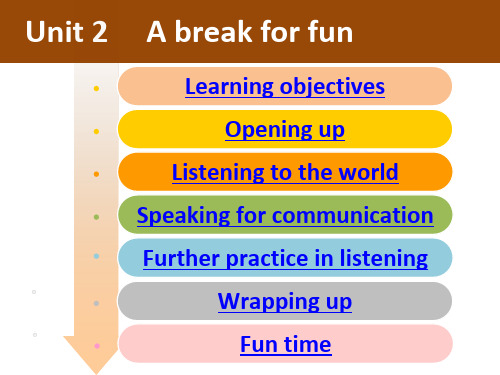
Learning objectives Opening up
Listening to the world Speaking for communication Further practice in listening
Wrapping up Fun time
only by myself / with my friends. 4 I love pop / classical / ___ja_z_z___
music.
Opening up
1 Read the statements. Then underline the alternatives which are true for you or fill in the blanks according to your own experiences.
Additional Notes
Australia
a historical romance movie released in 2008. In the movie, Nicole Kidman plays an English aristocrat ( 贵族) who inherits a huge ranch ( 大牧场) in Australia, and Hugh Jackman plays the cattle driver who helps protect her property. As they try to drive their cattle across the country, they witness the bombing of Darwin ( 澳 大利亚达尔文军港) by Japanese forces.
新视野大学英语视听说教程2第三版BOOK1-UNIT1 tang

Listening to the world
5 Discuss the questions.
1 Do you go out a lot? Why or why not? • Yes, I go out a lot with my friends. It can help me relax. • No, I don’t go out a lot because I have no time.
Listening to the world
4 Watch Part 3 and fill in the blanks.
Piccadilly Circus
a crossroads and public space in London. It is close to major shopping and entertainment areas in London’s West End.
Listening to the world
Sharing Listening Viewing
Listening to the world
BEFORE your listen
1 Discuss the questions. I admire my mother most. She loves me so much that she would do everything
Listening to the world
Listening skills
Exercise Listen to a weather forecast and note down the numbers showing the temperature.
It’s partly sunny this afternoon. Temperatures will remain 10 to 15 degrees with highs at 22 degrees. The chance of rain is 20 percent. Tomorrow morning, it will be mostly cloudy. Low temperatures will drop to 8 degrees in the suburbs, but the downtown area will see a high of 25 degrees. But there will be showers tomorrow night.
新视野视听说(第三版)B2U1电子教案

Opening up
Read the following quotes about learning. Do you agree with them? Why or why not?
UNIT 1Biblioteka Life is a learning curve
Unit 1 Life is a learning curve
Learning objectives Opening up
Listening to the world Speaking for communication Further practice in listening
Listening to the world
Sharing
3 Watch Part 3 and fill in the blanks.
E
F
I think I found 8)__F_re_n_c_h_____ very hard at school.
√1
2
A √3
B 4
C 5
E √7
D 6
F √8
G
H
Listening to the world
Sharing
4 Watch Part 3 and fill in the blanks.
A
B
A:The most difficult thing 1) I_h_a_v_e__e_v_e_r _le_a_r_n_e_d__is
Mandarin Chinese. I did it in evening classes a few years
新视野大学英语视听说教程2第三版BOOK1 UNIT2

Listening to the world
Sharing Listening Viewing
Listening to the world
BEFORE you listen
1 Listen to Part 1 and answer the question. The program is about ideas of beauty.
1 I go to the cinema about once a month / every two months / __e_ve_r_y__w_e_e_k__.
2 I prefer romantic / action / __co_m__e_d_y__ films. 3 I prefer going to the cinema
UNIT 2
A break for fun
Unit 2 A break for fun
Learning objectives Opening up
Listening to the world Speaking for communication Further practice in listening
bad-tempered, friendly, easy-going, introverted, extroverted, shy, cruel, mean, open-minded, outgoing, goodtempered
intelligent, bright, clever, dumb, stupid, smart, wise
1) tall 2) masculine face /
4 describe an event
Opening up
1 Read the statements. Then underline the alternatives which are true for you or fill in the blanks according to your own experiences.
新视野大学英语视听说教程第二册unit1
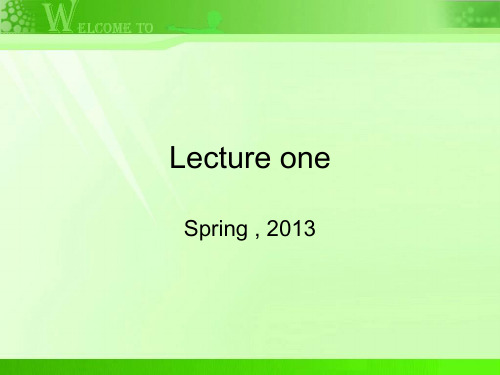
(Continued)
• •
Bob: Er, The Cranberries. They are the greatest. What about you? Don’t you like them? They make my stomach turn Laura: Ugh! (6) __________________________!
Like and dislike
SOut
peaking
a) How many expressions do you know about expressing likes? I like/love (music).
I prefer (talk shows) to (soap operas).
I’m interested in (literature).
be attached to, have a passion for, be addicted to
Q
uestion:
Important Words Expressions
ANSWER
and
It means to make somebody feel sick or upset.
What does “make my stomach turn” mean?
Q
uestion:
Important Words Expressions
ANSWER
and
It means fashionable.
What does “hip” mean here? Do you know any synonym to it? Can you make a sentence by using “hip”? Cool. The north side is becoming a really hip place to live.
新视野大学英语(第三版)第二册读写教程、视听说教程全部答案+教案(Units1-7)
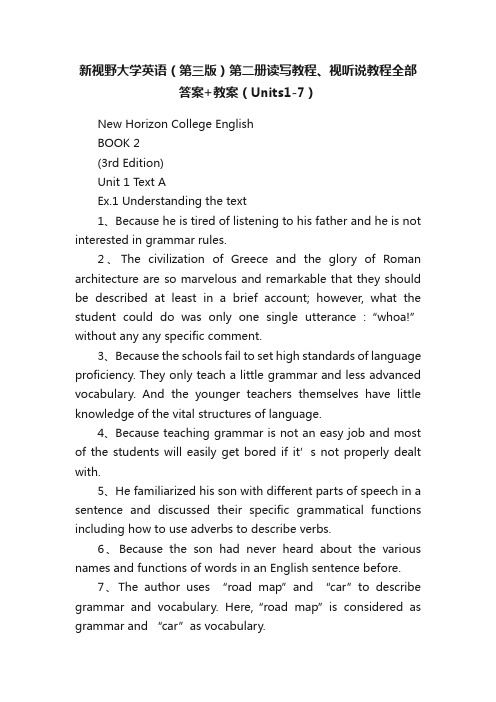
新视野大学英语(第三版)第二册读写教程、视听说教程全部答案+教案(Units1-7)New Horizon College EnglishBOOK 2(3rd Edition)Unit 1 Text AEx.1 Understanding the text1、Because he is tired of listening to his father and he is not interested in grammar rules.2、The civilization of Greece and the glory of Roman architecture are so marvelous and remarkable that they should be described at least in a brief account; however, what the student could do was only one single ut terance :“whoa!” without any any specific comment.3、Because the schools fail to set high standards of language proficiency. They only teach a little grammar and less advanced vocabulary. And the younger teachers themselves have little knowledge of the vital structures of language.4、Because teaching grammar is not an easy job and most of the students will easily get bored if it’s not properly dealt with.5、He familiarized his son with different parts of speech in a sentence and discussed their specific grammatical functions including how to use adverbs to describe verbs.6、Because the son had never heard about the various names and functions of words in an English sentence before.7、The author uses “road map”and “car”to describe grammar and vocabulary. Here,“road map”is considered as grammar and “car”as vocabulary.8、Since the subjunctive mood his son used is a fairly advanced grammar structure, the interjection“whoa!”reflects the tremendous pride the father had toward his son; it also reflects the author’s humor in using the word because it was once used by his student, though in two different situations and with two different feelings.Ex.3 Words in use1.condense2.exceed3.deficit4.exposure5.asset6.adequate/doc/694713736.html,petent8.adjusting9.precisely 10.beneficialEx.4 Word building-al/-ial:managerial/editorial/substance/survival/tradition/margin -cy : consistency/accuracy/efficient-y : recovery/ministry/assemblyEx.5 Word building1.editorial2.recovery3.accuracy4.substance5.managerial6.margin7.assembly8.Ministry9.survival 10.tradition 11.consistency 12.efficientEx.6 Banked cloze1-5: L C J A I 6-10: O N E H FEx.7 Expressions in use1.feel obliged to2.be serious about3.run into4.distinguish between5.thrust upon6.was allergic to7.get lost8.be attracted to9.make sense 10.looked upon asEx.8 Structured writingSome bookworms in my dormitory often spend hours reading their “Bible”, Practical English Grammar, and do a lot of exercises in that book , but I don’t ca re about it at all. My assumption is since I have never learned Chinese grammar, what’s the sense of learning English grammar? In fact, English grammar has always been a big headache to me.English grammar is very complicated because, unlike Chinese, there are many verb tenses. Even stranger than verb tenses, English grammar also contains something very confusing. For example, I don’t remember how many times my middle school teacher tried to“impose”the differences between used to and be used to on us. Sometimes he would go on with the explanation for 20 minutes or so. He even summarized the differences by listing three or four points for us to memorize. However, they could never stay in my head . I don’t remember how many times I got it wrong with the sentences containingused to or be used to on my exams . I was really confused with these two phrases,and I can never get them right.In brief, I’m allergic to learning English grammar. Curiously, I just wonder if the native speakers of English have a microcomputer in their brain to help them utter the two phrases promptly with just a click of their brain mouse!Ex.9 E-C Translation人们普遍认为英语是一种世界语言,经常被许多不以英语为第一语言的国家使用。
新视野大学英语视听说教程2第三版
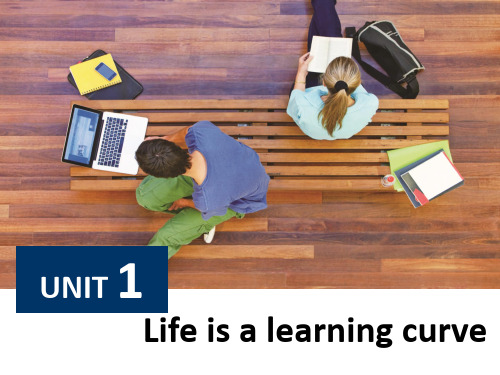
Opening up
Read the following quotes about learning. Do you agree with them? Why or why not?
A little knowledge is a dangerous thing. — Albert Einstein
√1
√2
A
B
3
4
C 5
E √7
D ing to the world
4 Watch Part 3 and fill in the blanks.
A
B
A:The most difficult thing 1) I_h_a_v_e__e_v_e_r _le_a_r_n_e_d__is
Mandarin Chinese. I did it in evening classes a few years
ago and I 2) _f_o_u_n_d_ it really, really difficult.
B:Probably capoeira, which is a Brazilian dance, martial art, fight thing. It’s 3) _a_c_o_m__b_in_a_t_io_n__of all these things. And yes, that was very difficult because there were lots of unusual 4)__b_o_d_y_m__o_ve_m__e_n_t_s___ to learn.
Listening to the world
3 Watch Part 3 and fill in the blanks.
新视野大学英语第二册(第三版)教案

New Horizon College EnglishBOOK 2(3rd Edition)Unit 1 An Impressive English Lesson课型:□ 理论课√ 理论、实践课□ 实践课课时分配: 6教学环境:多媒体教室教学目标:After studying this unit, the students are expected to be able to:1. understand the main idea and structure of Section A and Section B;2. master the key language points and grammatical structures in the texts3. talk about language teaching and learning and express their opinions about current way of teaching in an English class;4. read with the skill ―finding key ideas in sentences;5. write a composition with three main parts: introduction, body and conclusion.Key Issues:1. VocabularyTedious, absorbed, allergic, capture, condense, exceed, distinguish, distinctive, complimentary, complementary, proclaim, evidently, adequate, competent, adjust, beneficial2. SkillsLearn to read with the skill ―finding key ideas in sentences and write a composition with three main parts: introduction, body and conclusion.Potential Problems and Difficulties●To talk about language teaching and learning●write a composition with three main parts: introduction, body and conclusion.●To apply the phrases and patternsMethodology:A combination of traditional teaching methods with the communicative approach will be adopted. Special attention should be paid to classroom interaction like questioning and answers. Small group works are always needed while discussing the questions and the difficult translation practice. More encouragement is needed and more guidance will be given in their extracurricular study.Teaching Aids: Visual aids, projector, stereo and microphoneGroup work and pair workConduct of Tasks and Activities(师生互动方式Mode of Interaction; 学习策略Learning Strategies)Students-centered, Task-based teaching and learningTeaching ProceduresStep 1 Lead-inI. Greeting and warming-up questions discussion.1. What are the key factors that help people learn English as a foreign language?2. Do you have any problem in English learning?3. Do you think grammar is important in English learning?II. Listening and discussing.1. Listening practice.2. In your opinion, what is the most effective way to learn English?III. Listening to a talk and answer questions on page 2Step 2 Section A An Impressive English LessonI. Cultural background American university education1.What is Communicative Language Teaching?A type of teaching method;Develop the communicative ability as well as the knowledge of grammar; Learning by doing;Make classroom situation of real foreign language environment.2. What are the features of Communicative Language Teaching?Communicative competence is the goal;An integration of grammatical and functional teaching;Accuracy is secondary to conveying a message;Focus on communicative and contextual factors in language use;Learner-centered and experience-based.3. What is the role of teacher in Communicative Language Teaching?A facilitator of students’ learning;A manager of classroom activities;An advisor of students’ questions;A co-communicator in the communicative activity.II. Language PointsWords and expressions1. oddity: n. [C] a strange or unusual person or thing 怪人;怪物;奇特的东西With his neat suits on, he felt like an oddity walking in this poor neighborhood. 穿着笔挺的西装走在这个贫民区里,他觉得自己就像个怪物。
新视野大学英语第三版电子教案book2unit1A

新视野⼤学英语第三版电⼦教案book2unit1AUnit 1 Section A An impressive English lesson⼀堂难忘的英语课1 If I am the only parent who still corrects his child's English, then perhaps my son is right. To him, I am a tedious oddity: a father he is obliged to listen to andof earnest anticipation.2 我觉得我是在最近偶遇我以前的⼀位学⽣时,才开始对这个问题认真起来的。
这个学⽣刚从欧洲旅游回来。
我满怀着诚挚期待问她:“欧洲之⾏如何?”2 I think I got serious about this only recently when I ran into one of my former students, fresh from an excursion to Europe. (Para. 2)Meaning: I think I started to pay attention to other people’s usage of grammar only lately, when I happened to meet one of my former students, who had just returned from a short journey to Europe.3 “How was it?” I asked, full of earnest anticipation. (Para. 2)Meaning: When I asked about how her trip to Europe had been, I was expecting her response anxiously and sincerely. How was it?: (spoken) often used in conversation to ask sb. about their opinion or experience of sth. 怎么样?(⼝语常⽤表达,⽤于询问看法或经历)Did you watch the movie last night? How was it? 你昨天晚上看那部电影了吗?感觉怎么样?I was told that you had traveled to many places in Asia recently. How was it? 有⼈告诉我Note: The heavens means “the sky”. Here “search the heavens for the right words” implies the student tried hard to find suitable words to describe what she saw and experienced when traveling in Europe.Usage note: search, search for1 search: look through 检查;搜查They searched the man in front of me from head to foot. 他们把我前⾯的男⼦从头到脚搜查了⼀遍。
新视野大学英语(第三版)听说教程2-Unit1-电子教案

教案课程名称新视野英语教程听说教程2课时班级专业教师系部教研室教材《新视野英语教程听说教程2》教学题目Unit 1教学目标Pronunciation: Distinguish four groups of phonetic sounds: Listening: Get familiar with the topic of “food”.Speaking: Memorize useful expressions of showing likes and dislikes: ●What do you think about/of...?●How do you like...?●I love/like it.●I hate it.●It’s great.●It’s horrible.教学设计教学环节教师活动安排与建议(一)Warming-upListen to a song related to the topicof “Chicken Fried”.●By listening to the song, students (Ss) aregetting to know the theme of the unit.●The song “Chicken Fried” was recordedin 2003 by the Zac Brown Band, whosefrontman Zac Brown wrote it, for the 2005album Home Grown. The song has alsobeen placed at number 39 for the Taste ofCountry’s “Top 100 Country Songs of allTime” chart.(二)Telling Apart1.Help Ss practice the pronunciationof the phonetic sounds:2.Read the proverbs and sayings andpractice the tongue twister.●Play the recording and ask Ss to read aloud.●Correct their pronunciation when necessary.●For more exercises, please see Optionalexercises in Teacher’s Book.(三)Testing Your Ears1.Read new words, phrases andexpressions, and proper names.2.Listening exercises: simplesentences, conversations and apassage.3.Watch a video about an“Automatic Restaurant” inNuremberg, Germany.●Explain each new word, phrase and propername with one example sentence presentedin PPT.●When doing exercises, tell Ss to read thefour choices in advance;pay attention tothe importance of grammatical coherence.●Watch the video and try to answer thefollowing questions presented in PPT.。
2023年新视野大学英语视听说教程(第三版)第二册第一单元教案

新视野大学英语视听说教程(第三版)第二册第一单元教案备课纸授课题目:Unit 1授课时间:第____周第____周授课类型:实训课授课时数:4 教学目的及要求:By learning this unit, the student should 1) be able to talk about learning experiences. 2) listen for signal words for listing. 3) give and respond to advice.4) talk about learning / teaching methods.教学重点及难点:1. Listening skill: listen for signal words for listing.2. Speaking skill: give and respond to advice.教学方法和手段:Task-based communicative, multi-modal teaching through: 1. Recording listening; 2. Video watching; 3. PPT showing;4. Individual work, pair work We gain second-hand experience by reading books. A little knowledge is a dangerous thing.1Life is a learning curve备课纸— Albert EinsteinYes. It is dangerous for a person who knows a little about something thinks he knows it all.The best way to learn is to teach. — AnonymousYes. Going through the process of trying to explain something to others will help you understand, absorb and consolidate what you have learned.Step Two Listening to the world I. Sharing1. Watch a podcast for its general idea.2. Watch Part 1 and fill in the blanks.3. Watch Part 2 and check the true statements.4. Watch Part 3 and fill in the blanks.5. Work in pairs and discuss the question. II. Listening1. Introduce the listening Skill: Listening for signal words for listing Listen for the total number of items at the beginningListen for words and expressions that signal the beginning, following and end of the listinge.g. the last, the final, lastly, and finally Listing items with equal valuee.g. to begin with, to start with, furthermore, moreover, inaddition, besides, what’s more, the last but not the least, lastly, finally Words and expressions indicating importanceexpressions: above all, the most important / obvious / noteworthy Adjectives: main, vital, significant, chief, central, principal, primary, major, distinctive, and the –est forms of adjectives Listen to Part 2 of the radio program. Then match the people to the film stars they like.2. Listen to a radio program and rearrange the following expressions.3. Listen to the radio program again and complete the table.4. Fill in the blanks.III. Viewing1. Read the program information below and check the true statements.2. Read the statements. Then watch the video clip and underline the correct alternative.3. Read the statements and the answer choices. Then watch the video clip again and choose the best answers.2备课纸Step Three Speaking for communication1. Read the statements. Then listen to a conversation and check the true statements.2. Read the table. Then listen to the conversationand write G for giving advice and R for responding to advice in the right column.Speaking Skill: Giving and responding to adviceGiving and responding to advice in an appropriate way are useful and important speaking skills.Expressions for giving advice Why don’t you…?My( main/personal) recommendation/suggestion/ is/would be…If that happened to me/ If I were in your place/ if I were you/ In that case, I’d recommend…Do you think it is a good idea…? The sooner you…the better.…might work/ would probably work/is worth a try.If you ask me/ The way I see it, it probably would have been better(not) to have… Expressions for responding to advice ? Thank you, I’ll take that into consideration. ? Thanks. That sounds good/interesting.I hadn’t thought of that before. Thank you so much for offering that advice. Thank you for the advice. I’ll try… Maybe you’re right. Thanks for saying that.3. Look at the pictures and read the conversations below. Then fill in the blanks using the words in brackets.4. Role-play the situations.Step Four Further practice in listening I. Short Conversations1 Q: What can we learn from the conversation?B The woman should seek help from the writing center. 2 Q: Why does the woman choose to learn French?D She thinks speaking French is a must for cultured people.3 Q: What did the man do last night? D He attended a speech.4 Q: What made Melissa unhappy?C That she lost her chance to enter the contest. 5 Q: What does the man think of the woman’s opinion? A It is one-sided. II. Long Conversation1 Q: How is the woman doing in the man’s class?C She often fails to turn in her homework on time. 2 Q: What does the woman think of learning Spanish?3备课纸D It presents difficulty for her.3 Q: What do we know from this conversation about the man?A He has a good personal relationship with the woman.4 Q: What is the woman most likely to do after talking with the man?C Work harder in her Spanish class. III. Passages 1. Passage one1 Q: What do you know about the speaker’s Spanish learning experience in high school?D She showed dissatisfaction with the slow pace of her class.2 Q: What made the speaker feel more frustrated while learning Spanish in high school?A She had to learn the material that she already knew.3 Q: What did the speaker say about her study of Spanish literature in college? C It proved to be an unbalanced way to learn the language.4 Q: Which experience benefited the speaker most in terms of her use of Spanish? D She taught Spanish speakers how to speak English. 2. Passage two 1) alternative 2) numerous 3) traditional 4) academic 5) countryside 6) athletes7) take advantage of 8) Secondary9) in a collective effort 10) serve as作业:Preview Section B。
大学新视野英语第二册(第三版)课程教案

New Horizon College EnglishBOOK 2(3rd Edition)Unit 1 An Impressive English Lesson课型:□理论课√理论、实践课□实践课课时分配:6教学环境:多媒体教室教学目标:After studying this unit, the students are expected to be able to:1. understand the main idea and structure of Section A and Section B;2. master the key language points and grammatical structures in the texts3. talk about language teaching and learning and express their opinions about current way of teaching in an English class;4. read with the skill ―finding key ideas in sentences;5. write a composition with three main parts: introduction, body and conclusion.Key Issues:1. VocabularyTedious, absorbed, allergic, capture, condense, exceed, distinguish, distinctive, complimentary, complementary, proclaim, evidently, adequate, competent, adjust, beneficial2. SkillsLearn to read with the skill ―finding key ideas in sentences and write a composition with three main parts: introduction, body and conclusion.Potential Problems and Difficulties●To talk about language teaching and learning●write a composition with three main parts: introduction, body andconclusion.●To apply the phrases and patternsMethodology:A combination of traditional teaching methods with the communicative approach will be adopted. Special attention should be paid to classroom interaction like questioning and answers. Small group works are always needed while discussing the questions and the difficult translation practice. More encouragement is needed and more guidance will be given in their extracurricular study.Teaching Aids: Visual aids, projector, stereo and microphoneGroup work and pair workConduct of Tasks and Activities(师生互动方式Mode of Interaction; 学习策略Learning Strategies)Students-centered, Task-based teaching and learningTeaching ProceduresStep 1 Lead-inI. Greeting and warming-up questions discussion.1. What are the key factors that help people learn English as a foreign language?2. Do you have any problem in English learning?3. Do you think grammar is important in English learning?II. Listening and discussing.1. Listening practice.2. In your opinion, what is the most effective way to learn English?III. Listening to a talk and answer questions on page 2Step 2 Section A An Impressive English LessonI. Cultural background American university education1.What is Communicative Language Teaching?A type of teaching method;Develop the communicative ability as well as the knowledge of grammar;Learning by doing;Make classroom situation of real foreign language environment.2. What are the features of Communicative Language Teaching? Communicative competence is the goal;An integration of grammatical and functional teaching;Accuracy is secondary to conveying a message;Focus on communicative and contextual factors in language use; Learner-centered and experience-based.3. What is the role of teacher in Communicative Language Teaching?A facilitator of students’learning;A manager of classroom activities;An advisor of students’questions;A co-communicator in the communicative activity.II. Language PointsWords and expressions1. oddity: n. [C] a strange or unusual person or thing 怪人;怪物;奇特的东西With his neat suits on, he felt like an oddity walking in this poor neighborhood. 穿着笔挺的西装走在这个贫民区里,他觉得自己就像个怪物。
新视野大学英语第二册(第三版)教案(精品资料).doc
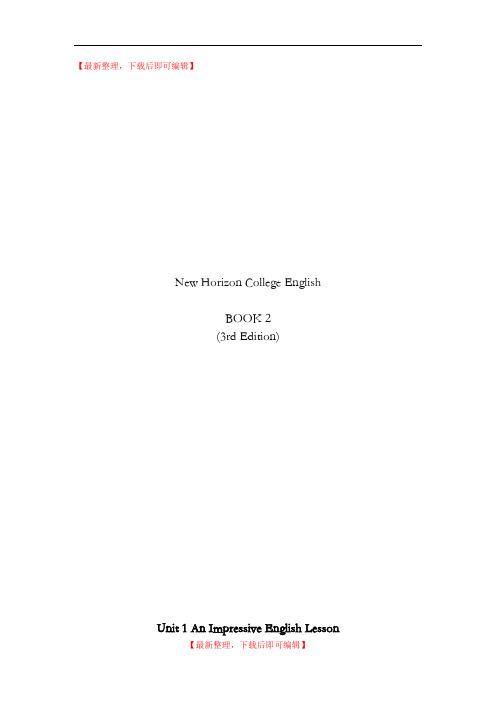
【最新整理,下载后即可编辑】New Horizon College EnglishBOOK 2(3rd Edition)Unit 1 An Impressive English Lesson课型:□ 理论课√ 理论、实践课□ 实践课课时分配:6教学环境:多媒体教室教学目标:After studying this unit, the students are expected to be able to:1. understand the main idea and structure of Section A and Section B;2. master the key language points and grammatical structures in the texts3. talk about language teaching and learning and express their opinions about current way of teaching in an English class;4. read with the skill ―finding key ideas in sentences;5. write a composition with three main parts: introduction, body and conclusion.Key Issues:1. VocabularyTedious, absorbed, allergic, capture, condense, exceed, distinguish, distinctive, complimentary, complementary, proclaim, evidently, adequate, competent, adjust, beneficial2. SkillsLearn to read with the skill ―finding key ideas in sentences and write a composition with three main parts: introduction, body and conclusion. Potential Problems and Difficulties●To talk about language teaching and learning●write a composition with three main parts: introduction, body and conclusion.●To apply the phrases and patternsMethodology:A combination of traditional teaching methods with the communicative approach will be adopted. Special attention should be paid to classroom interaction like questioning and answers. Small group works are always needed while discussing the questions and the difficult translation practice. More encouragement is needed and more guidance will be given in their extracurricular study.Teaching Aids: Visual aids, projector, stereo and microphoneGroup work and pair workConduct of Tasks and Activities(师生互动方式Mode of Interaction; 学习策略Learning Strategies)Students-centered, Task-based teaching and learningTeaching ProceduresStep 1 Lead-inI. Greeting and warming-up questions discussion.1. What are the key factors that help people learn English as a foreign language?2. Do you have any problem in English learning?3. Do you think grammar is important in English learning?II. Listening and discussing.1. Listening practice.2. In your opinion, what is the most effective way to learn English? III. Listening to a talk and answer questions on page 2Step 2 Section A An Impressive English LessonI. Cultural background American university education1.What is Communicative Language Teaching?A type of teaching method;Develop the communicative ability as well as the knowledge of grammar;Learning by doing;Make classroom situation of real foreign language environment. 2. What are the features of Communicative Language Teaching? Communicative competence is the goal;An integration of grammatical and functional teaching; Accuracy is secondary to conveying a message;Focus on communicative and contextual factors in language use; Learner-centered and experience-based.3. What is the role of teacher in Communicative Language Teaching?A facilitator of students’ learning;A manager of classroom activities;An advisor of students’ questions;A co-communicator in the communicative activity.II. Language PointsWords and expressions1. oddity: n. [C] a strange or unusual person or thing 怪人;怪物;奇特的东西With his neat suits on, he felt like an oddity walking in this poor neighborhood. 穿着笔挺的西装走在这个贫民区里,他觉得自己就像个怪物。
新视野大学英语视听说教程第二册第一单元教案

授课题目:Unit 1 Life is a learning curve授课时间:第____周第____周授课类型:实训课授课时数:4教学目的及要求:By learning this unit, the student should1) be able to talk about learning experiences.2) listen for signal words for listing.3) give and respond to advice.4) talk about learning / teaching methods.教学重点及难点:1.Listening skill: listen for signal words for listing.2.Speaking skill: give and respond to advice.教学方法和手段:Task-based communicative, multi-modal teaching through:1.Recording listening;2.Video watching;3.PPT showing;4.Individual work, pair work & group work.教学内容和过程:Unit 2 A Break for FunStep One Opening upRead the following quotes about learning. Do you agree with them Why or why notWe learn by doing.— Aristotle.I partly agree with the quote because it is not the only way of learning: We gain first-hand experience by interacting with the environment;We gain second-hand experience by reading books.A little knowledge is a dangerous thing.— Albert EinsteinYes. It is dangerous for a person who knows a little about something thinks he knows it all.The best way to learn is to teach.— AnonymousYes. Going through the process of trying to explain something to others will help you understand, absorb and consolidate what you have learned.Step Two Listening to the worldI.Sharing1.Watch a podcast for its general idea.2.Watch Part 1 and fill in the blanks.3.Watch Part 2 and check the true statements.4.Watch Part 3 and fill in the blanks.5.Work in pairs and discuss the question.II.Listening1.Introduce the listening Skill: Listening for signal words for listing2. Listen for the total number of items at the beginning3. Listen for words and expressions that signal the beginning, followingand end of the listing4. . the last, the final, lastly, and finally5. Listing items with equal value6. . to begin with, to start with, furthermore, moreover, in addition,besides, what’s more, the las t but not the least, lastly, finally7.Words and expressions indicating importance8. expressions: above all, the most important / obvious / noteworthy9.Adjectives: main, vital, significant, chief, central, principal,primary, major, distinctive, and the –est forms of adjectives Listen to Part 2 of the radio program. Then match the people to the film stars they like.10.Listen to a radio program and rearrange the following expressions.11.Listen to the radio program again and complete the table.12.Fill in the blanks.13.III.Viewing1.Read the program information below and check the true statements.2.Read the statements. Then watch the video clip and underline thecorrect alternative.3.4.Read the statements and the answer choices. Then watch the video clipagain and choose the best answers.Step Three Speaking for communication1.Read the statements. Then listen to a conversation and check the truestatements.2.Read the table. Then listen to the conversation and write G for givingadvice and R for responding to advice in the right column.3.Speaking Skill: Giving and responding to adviceGiving and responding to advice in an appropriate way are useful and important speaking skills.Expressions for giving adviceWhy don’t you…My( main/personal) recommendation/suggestion/ is/would be…If that happened to me/ If I were in your place/ if I were you/ In that case, I’d recommend…Do you think it is a good idea…The sooner you…the better.…might work/ would probably work/is worth a try.If you ask me/ The way I see it, it probably would have been better(not) to have…Expressions for responding to advice•Thank you, I’ll take that into consideration.• Thanks. That sounds good/interesting.I hadn’t thought of that before. Thank you so much for offering that advice.Thank you fo r the advice. I’ll try…Maybe you’re right.Thanks for saying that.4.Look at the pictures and read the conversations below. Then fill inthe blanks using the words in brackets.5.Role-play the situations.Step Four Further practice in listeningI.Short Conversations1 Q: What can we learn from the conversationB The woman should seek help from the writing center.2 Q: Why does the woman choose to learn FrenchD She thinks speaking French is a must for cultured people.3 Q: What did the man do last nightD He attended a speech.4 Q: What made Melissa unhappyC That she lost her chance to enter the contest.5 Q: What does the man think of the woman’s opinionA It is one-sided.II. Long Conversation1 Q: How is the woman doing in the man’s cl assC She often fails to turn in her homework on time.2 Q: What does the woman think of learning SpanishD It presents difficulty for her.3 Q: What do we know from this conversation about the manA He has a good personal relationship with the woman.4 Q: What is the woman most likely to do after talking with the manC Work harder in her Spanish class.III. Passages1.Passage one1 Q: What do you know about the speaker’s Spanish learning experience in high schoolD She showed dissatisfaction with the slow pace of her class.2 Q: What made the speaker feel more frustrated while learning Spanish in high schoolA She had to learn the material that she already knew.3 Q: What did the speaker say about her study of Spanish literature in collegeC It proved to be an unbalanced way to learn the language.4 Q: Which experience benefited the speaker most in terms of her use of SpanishD She taught Spanish speakers how to speak English.2. Passage two1) alternative2) numerous3) traditional4) academic5) countryside6) athletes7) take advantage of8) Secondary9) in a collective effort10) serve as作业:Preview Section B参考文献:1.郑树棠. 新视野大学英语视听说教程(第三版)第二册[M]. 北京:外语教学与研究出版社,2015.2.郑树棠. 新视野大学英语视听说教程(第三版)第二册教师用书[M]. 北京:外语教学与研究出版社,2015.3.夏纪梅. 现代外语课堂设计理论与实践[M]. 上海:上海外语教育出版社,2003.4.秦秀白. 《新世纪大学英语系列教程》第二册[M]. 上海:上海外语教育出版社,2007(2009重印).5.杨治中主编.《新起点大学基础英语教程系列》第二册[M]. 北京:外语教学与研究出版社,2004.6.翟象俊等主编. 《21世纪大学英语系列教程》第二版第二册[M]. 厦门:复旦大学出版社,2008.课后小结:。
- 1、下载文档前请自行甄别文档内容的完整性,平台不提供额外的编辑、内容补充、找答案等附加服务。
- 2、"仅部分预览"的文档,不可在线预览部分如存在完整性等问题,可反馈申请退款(可完整预览的文档不适用该条件!)。
- 3、如文档侵犯您的权益,请联系客服反馈,我们会尽快为您处理(人工客服工作时间:9:00-18:30)。
授课题目:Unit 1 Life is a learning curve授课时间:第____周第____周授课类型:实训课授课时数:4教学目的及要求:By learning this unit, the student should1) be able to talk about learning experiences.2) listen for signal words for listing.3) give and respond to advice.4) talk about learning / teaching methods.教学重点及难点:1.Listening skill: listen for signal words for listing.2.Speaking skill: give and respond to advice.教学方法和手段:Task-based communicative, multi-modal teaching through:1.Recording listening;2.Video watching;3.PPT showing;4.Individual work, pair work & group work.教学内容和过程:Unit 2 A Break for FunStep One Opening upRead the following quotes about learning. Do you agree with them? Why or why not?We learn by doing.— Aristotle.I partly agree with the quote because it is not the only way of learning:We gain first-hand experience by interacting with the environment;We gain second-hand experience by reading books.A little knowledge is a dangerous thing.— Albert EinsteinYes. It is dangerous for a person who knows a little about something thinks he knows it all.The best way to learn is to teach.— AnonymousYes. Going through the process of trying to explain something to others will help you understand, absorb and consolidate what you have learned.Step Two Listening to the worldI.Sharing1.Watch a podcast for its general idea.2.Watch Part 1 and fill in the blanks.3.Watch Part 2 and check the true statements.4.Watch Part 3 and fill in the blanks.5.Work in pairs and discuss the question.II.Listening1.Introduce the listening Skill: Listening for signal words for listingListen for the total number of items at the beginningListen for words and expressions that signal the beginning, following and end of the listinge.g. the last, the final, lastly, and finallyListing items with equal valuee.g. to begin with, to start with, furthermore, moreover, in addition, besides,what’s more, the last but not the least, lastly, finallyWords and expressions indicating importanceexpressions: above all, the most important / obvious / noteworthyAdjectives: main, vital, significant, chief, central, principal, primary, major, distinctive, and the –est forms of adjectives Listen to Part 2 of the radio program.Then match the people to the film stars they like.2.Listen to a radio program and rearrange the following expressions.3.Listen to the radio program again and complete the table.4.Fill in the blanks.III.Viewing1.Read the program information below and check the true statements.2.Read the statements. Then watch the video clip and underline the correctalternative.3.Read the statements and the answer choices. Then watch the video clip again andchoose the best answers.Step Three Speaking for communication1.Read the statements. Then listen to a conversation and check the true statements.2.Read the table. Then listen to the conversation and write G for giving advice andR for responding to advice in the right column.Speaking Skill: Giving and responding to adviceGiving and responding to advice in an appropriate way are useful and important speaking skills.Expressions for giving adviceWhy don’t you…?My( main/personal) recommendation/sugges tion/ is/would be…If that happened to me/ If I were in your place/ if I were you/ In that case, I’d recommend…Do you think it is a good idea…?The sooner you…the better.…might work/ would probably work/is worth a try.If you ask me/ The way I see it, i t probably would have been better(not) to have…Expressions for responding to advice•Thank you, I’ll take that into consideration.• Thanks. That sounds good/interesting.I hadn’t thought of that before. Thank you so much for offering that advice.Tha nk you for the advice. I’ll try…Maybe you’re right.Thanks for saying that.3.Look at the pictures and read the conversations below. Then fill in the blanksusing the words in brackets.4.Role-play the situations.Step Four Further practice in listeningI.Short Conversations1 Q: What can we learn from the conversation?B The woman should seek help from the writing center.2 Q: Why does the woman choose to learn French?D She thinks speaking French is a must for cultured people.3 Q: What did the man do last night?D He attended a speech.4 Q: What made Melissa unhappy?C That she lost her chance to enter the contest.5 Q: What does the man think of the woman’s opinion?A It is one-sided.II. Long Conversation1 Q: How is the woman doing in the man’s class?C She often fails to turn in her homework on time.2 Q: What does the woman think of learning Spanish?D It presents difficulty for her.3 Q: What do we know from this conversation about the man?A He has a good personal relationship with the woman.4 Q: What is the woman most likely to do after talking with the man?C Work harder in her Spanish class.III. Passages1.Passage one1 Q: What do you know about the speaker’s Spanish learning experience in high school?D She showed dissatisfaction with the slow pace of her class.2 Q: What made the speaker feel more frustrated while learning Spanish in high school?A She had to learn the material that she already knew.3 Q: What did the speaker say about her study of Spanish literature in college?C It proved to be an unbalanced way to learn the language.4 Q: Which experience benefited the speaker most in terms of her use of Spanish?D She taught Spanish speakers how to speak English.2. Passage two1) alternative2) numerous3) traditional4) academic5) countryside6) athletes7) take advantage of8) Secondary9) in a collective effort10) serve as作业:Preview Section B参考文献:1.郑树棠. 新视野大学英语视听说教程(第三版)第二册[M]. 北京:外语教学与研究出版社,2015.2.郑树棠. 新视野大学英语视听说教程(第三版)第二册教师用书[M]. 北京:外语教学与研究出版社,2015.3.夏纪梅. 现代外语课堂设计理论与实践[M]. 上海:上海外语教育出版社,2003.4.秦秀白. 《新世纪大学英语系列教程》第二册[M]. 上海:上海外语教育出版社,2007(2009重印).5.杨治中主编.《新起点大学基础英语教程系列》第二册[M]. 北京:外语教学与研究出版社,2004.6.翟象俊等主编. 《21世纪大学英语系列教程》第二版第二册[M]. 厦门:复旦大学出版社,2008.课后小结:。
